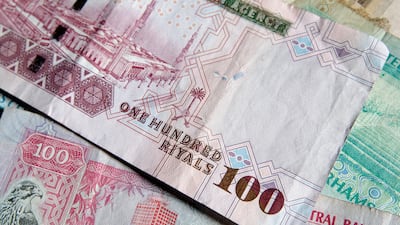Debt capital markets in the Gulf were busier in 2020 as governments borrowed to plug financing gaps but are likely to quieten this year as the need for funding recedes, according to a new report.
The amount of bonds and sukuk issued by governments in the year to November 2020 stood at $47.5 billion and the amount of sukuk at $28.7bn, compared with $48.8bn in bonds and $34.3bn of sukuk during the whole of 2019. Corporate issuers tapped debt markets for $46.2bn in bonds and $19.9bn in sukuk in the year to November 2020, compared with $45.3bn and $14.8bn for all of 2019, Kamco Invest said in a note.
"The fiscal pressure from the decline in economic activity and lower oil revenues has resulted in an increase in debt issuances in the GCC in 2020. This is in line with issuances across the globe," Kamco analyst Junaid Ansari, the report’s author, said.
Global debt market issuance soared last year, rising 31 per cent to $10.26 trillion according to financial data company Refinitiv. The fees earned by investment bankers for arranging debt issuance climbed 25 per cent to $42.9bn, the company said in its 2020 Global Banking Review published on Thursday.
Debt issuance by GCC governments is likely to decline this year, however, as governments phase out some of the emergency spending measures put in place as the pandemic eases. In recent weeks, Saudi Arabia's government set a 990bn riyal budget, a 7.5 per cent decline on 2020. The government of Dubai set a Dh57.1bn budget, a 14 per cent decline on the record budget of Dh66.4bn for 2020.
"We believe that 2020 was an exceptional year with extreme events, like the steep fall in economic growth rates across the globe and in the GCC, as well as the historic decline in oil prices," Mr Junaid said.
The combined budget deficits of GCC countries is likely to narrow to $84.3bn this year compared to $127bn in 2020, the report said, citing figures from the International Monetary Fund.
However, corporate issuers are expected to ramp up borrowing, particularly as the cost of capital remains low, meaning overall issuance is likely to be "flat or slightly decline" this year.
"I believe corporate debt issuances will go up mainly on the strength of improvement in economic conditions, resulting in appetite for new debt capital as well as the opportunity surrounding borrowers to benefit from lower cost of capital on the strength of a benign interest rate regime," Ullas Rao, an assistant professor of finance at Heriot Watt University in Dubai, said.
"Overall, the GCC nations have done extremely well in containing the pandemic so far with some of the lowest mortality rates. The inoculation drive initiated by most GCC nations adds to the positive momentum towards a faster economic recovery, boosting investors' confidence," he added.
Over the next five years, some $157.1bn of GCC government debt and $164.3bn of corporate debt is set to mature. Of the $321.4bn total, about 64 per cent are bonds and 36 per cent sukuk. About 61 per cent is denominated in US dollars and the rest is a mix of local and other global currencies.


